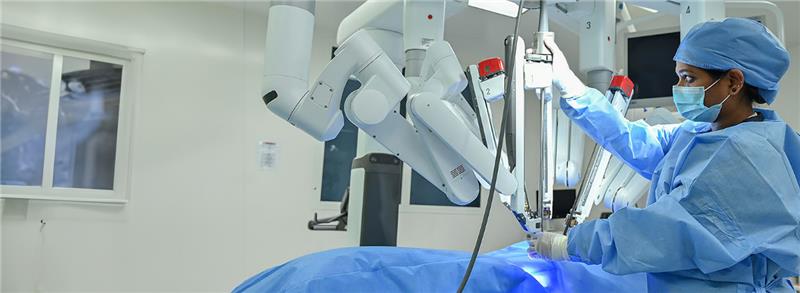Maya, a breast cancer survivor, underwent Whipple procedure to treat periampullary cancer
February 15
Abu Dhabi: In a story of resilience and courage, a 59-year-old Emirati mother of five has triumphed over a second cancer diagnosis, this time with the aid of cutting-edge robotic surgery that removed several organs with unparalleled precision.
A ‘second cancer’ refers to a new type of cancer that develops after a patient has been treated for an initial, unrelated cancer.
In this case, Maya Muhammad Al-Hajri, a breast cancer survivor from Abu Dhabi, underwent a complex 12-hour Whipple procedure using robotic technology to remove her gallbladder, parts of her pancreas, stomach, and surrounding structures, successfully treating a rare and life-threatening periampullary cancer.
Her health ordeal began seven years ago when Maya was diagnosed with breast cancer, which was treated in 2019. Despite the emotional toll of that experience, she lived a determined life only to face a new challenge.
“I thought my nightmares were over, but they weren’t,” Maya, an administrative employee, recalled.
In July 2024, Maya developed jaundice because of a blocked biliary system, which led to the discovery of a tumour in the periampullary region – the area where the bile and pancreatic ducts meet.
Surgery lasted half a day
Doctors at Burjeel Medical City (BMC) recommended the Whipple procedure – a high-risk surgery to remove the gallbladder, bile duct, part of the pancreas, stomach, small intestine, and lymph nodes. Traditionally, this procedure requires a large abdominal incision and a multidisciplinary surgical team. However, at BMC, the surgery was performed using the da Vinci robotic system, a breakthrough in minimally invasive surgery introduced at the hospital in 2023.
Maya was unperturbed by the idea of robotic surgery, understanding its numerous benefits.
“I was aware of its great advantages compared to traditional surgery, such as a reduced recovery period, smaller incisions, and lower risk of complications and bleeding. This made us confident in trusting this modern technology,” she said.
Dr Ali Iyoob, the lead surgeon, performed the procedure, which lasted about 12 hours.
“The robotic system allowed for greater precision, enhanced visualisation of intricate anatomical structures, and a reduced risk of complications,” Dr Iyoob, consultant and head of gastrointestinal surgery, said.
“Despite challenges like multiple affected lymph nodes, an enlarged liver with abnormal blood supply, multi-regional dissections, and pancreatic head resection in a confined anatomical space, the surgery went smoothly and successfully,” he noted.
Following the removal of affected organs, the surgery involved the highly complex reconstruction of the digestive pathways for food and bilio-pancreatic juices.
“Robotic technology significantly reduced the risk of inadvertent damage to surrounding organs, minimised blood loss, and improved the overall reconstruction process,” Dr Iyoob said.
The robotic approach facilitated safer and more precise reconnections of the smaller bile and pancreatic ducts, reducing the likelihood of leaks that could complicate recovery.
“Thanks to the da Vinci system, the patient’s recovery was swift. The precision and efficiency of the robotic procedure were key in allowing her to return to her daily life sooner than expected,” Dr Iyoob underlined.
Currently, Maya is leading a happy and peaceful life and is grateful for the availability of advanced robotic treatments in the country.
“I thank my sister Rahma, my family, and the medical team for their full support as I overcame my health crisis. I have made a full recovery,” Maya said.


